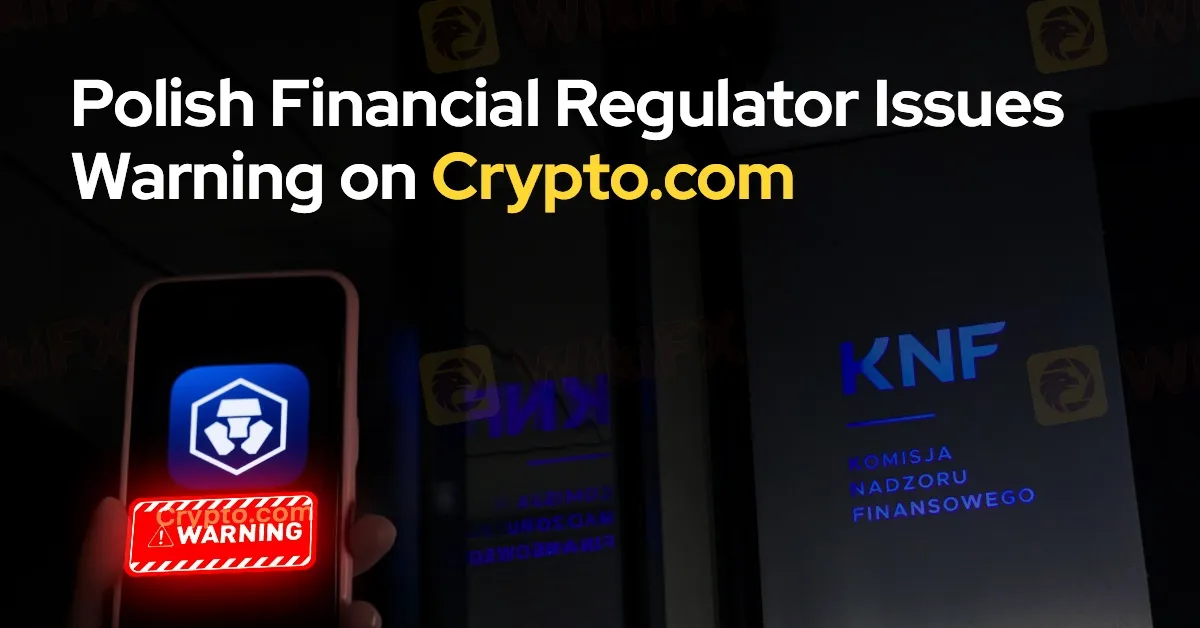Polish Financial Regulator Issues Warning on Crypto.com
Abstract:The Polish Financial Supervision Authority (KNF) has recently issued a cautionary warning regarding Foris DAX MT, the Malta-based entity operating under the Crypto.com brand

The Polish Financial Supervision Authority (KNF) has recently issued a cautionary warning regarding Foris DAX MT, the Malta-based entity operating under the Crypto.com brand. This alert, though not an outright ban, aims to inform Polish investors of potential risks linked to Crypto.com's operations in Poland, emphasising the need for due diligence when engaging with foreign crypto platforms.
Under Polish law, companies that provide brokerage or investment services within Poland are required to hold proper licenses. According to Article 178 of the Act on Trading in Financial Instruments, these licenses are essential for regulatory compliance. The KNF flagged Foris DAX MT for potentially breaching these licensing requirements and has referred the matter to the Warsaw Regional Prosecutors Office for further examination.

Currently, Crypto.com is not on the KNF‘s blacklist, which would signify outright prohibition. However, the warning serves as an alert for Polish citizens about potential unauthorised financial activities from the company. The KNF’s public warning list, which includes 413 institutions as of now, primarily aims to protect consumers from firms suspected of engaging in unlicensed financial services. Crypto.com, as the largest entity on this list, is under scrutiny, though the final course of action will depend on the Prosecutor‘s Office’s review.
In response to the KNF‘s alert, a spokesperson for Crypto.com clarified that the company is actively working with legal advisors to address the regulator’s concerns and ensure compliance. Tomek Kolodziejczuk, a Bitcoin advocate in Poland, noted that the warning does not signify a ban but is an essential reminder for investors to stay aware of regulatory statuses when engaging with crypto platforms.
The scrutiny from Polands financial regulator aligns with broader efforts to oversee cryptocurrency activities without outright prohibition. Although Poland has not banned virtual assets, the KNF remains cautious and encourages a balanced regulatory approach, similar to other nations. The regulator frequently advises consumers to exercise caution, given the high volatility, complex nature, and lack of robust consumer protections within many cryptocurrency markets.
KNF officials have consistently warned potential crypto investors that trading in digital assets carries substantial risk, including the possibility of total financial loss. The regulator emphasises that while crypto trading is legal within Poland, it lacks the extensive consumer protection measures typically found in traditional financial products. The KNF's stance aims to educate the public on the inherent risks and volatility associated with cryptocurrencies, as well as to mitigate the possibility of misuse or financial crime within the industry.
Meanwhile, on the international front, Crypto.com CEO Kris Marszalek recently announced a lawsuit against the U.S. Securities and Exchange Commission (SEC), accusing the regulatory body of overreach, which he claims has negatively impacted millions of crypto holders in the United States. The move highlights the challenges cryptocurrency firms face in navigating various national regulatory landscapes, as crypto regulations continue to evolve globally.
Ultimately, the KNF‘s actions underscore Poland’s cautious yet permissive stance toward crypto-assets, emphasising regulatory compliance while providing investors with ample information to make informed decisions.

Read more

Cryptocurrency Money Launderer Sentenced to Over 10 Years for Laundering $20 Million in Criminal Fun
An Indian national exposed laundering $20M via cryptocurrency and Hawala networks, revealing intricate money laundering techniques.

$TRUMP Token Soars: A New Era for Trump and Cryptocurrency?
Donald Trump has taken an unexpected step into the cryptocurrency market ahead of his January 20 inauguration by launching a memecoin named $TRUMP. The announcement sparked significant speculation and trading activity, with the coin’s value skyrocketing within hours of its debut.

Crypto.com’s Dual Front Battle: European Progress and U.S. Regulation
Crypto.com has received conditional approval to operate under the European Union’s Markets in Crypto-Assets (MiCA) framework. Once fully licensed, this will enable the company to serve customers throughout the EU under a standardised set of rules.

Boerse Stuttgart Digital Secures EU-Wide MiCAR Crypto License
Boerse Stuttgart Digital secures Germany’s first MiCA license, enabling EU-wide operations and expanding its digital asset services.
WikiFX Broker
Latest News
Will Gold Prices Continue to Rise Due to Trump’s Tariffs?
Miami Firm Owner Pleads Guilty to $6M Ponzi Scheme Fraud
NBI Cebu Arrests Forex Trader for Illegal Investment Solicitation
PU Prime's "Feather Your Trades" Contest! Begin
eToro Files for IPO with $5 Billion Valuation on NASDAQ
Is FizmoFX a Scam? Fraud and Account Suspension of Traders
IG Japan Extends US Stock CFD Trading Hours in 2025
ALERT! Warning against Livaxxen
Which Zodiac Sign Makes the Best Trader?
BOJ to Announce Policy Decision This Week, Market Bets on a Rate Hike
Rate Calc

